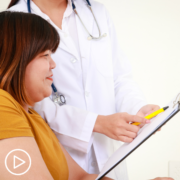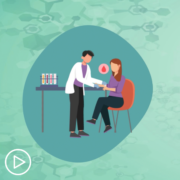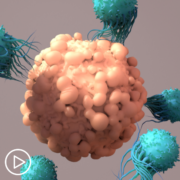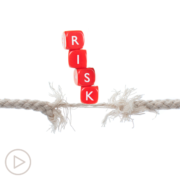Can Race or Ethnicity Impact CAR T-Cell Therapy Response?
Can Race or Ethnicity Impact CAR T-Cell Therapy Response? from Patient Empowerment Network on Vimeo.
Can CAR T-cell therapy response be impacted by patient race or ethnicity? Expert Dr. Sikander Ailawadhi from Mayo Clinic discusses some impacts to CAR T-cell therapy response for African Americans and some clinical methods to help reduce impacts to patients.
[ACT]IVATION TIP
“…there is a lot of work happening, research happening around how to predict and prevent side effects from CAR T so that the patients are much more informed, aware, can make an informed decision, and as clinicians, we can do whatever is within our control and is at our disposal to help prevent those side effects and make CAR T an even safer and more beneficial treatment for patients.”
See More from [ACT]IVATED CAR T
Related Resources:

|

How Can Information Disparities on Emerging Therapies Be Addressed? |

|
Transcript:
Lisa Hatfield:
Dr. Ailawadhi, is there data around ethnicity and response to CAR T-cell therapy and whether genetic factors may affect treatment outcomes? And can the side effects of CAR T-cell therapy be predicted or prevented?
Dr. Sikander Ailawadhi:
So Lisa, a very important question of whether there are racial ethnic factors that can affect CAR T-cell therapy benefit or side effects, and what are we doing to prevent some of these side effects? We know side effects can happen, what can we do to actually prevent them? So I’ll take this question in two different subgroups. The first one of talking about racial ethnic groups or differences. So we know patients who are African Americans. This is one study reported that African Americans are more likely to have side effects from CAR T-cell therapy.
So while it’s not a specific “genetic factor,” but race ethnicity can sometimes be associated with more side effects, and that is just because these are very inflammatory delivered or inflammatory mediated side effects like CRS. It’s also important to know that there are certain other factors, disease or treatment-related factors, that can help predict potentially more side effects with CAR T. For example, patients who are very heavily pre-treated, patients who have a very high disease burden, patients who did not respond to bridging therapy that was given to them prior to the CAR T.
These are all factors where we know that side effects are going to be more, and the success of the treatment might be lesser. What we are trying to do to mitigate some of these side effects, there are now studies which are giving either some low doses of steroids as a prophylaxis before, right around the time of CAR T, so that side effects may not happen. Studies that are giving a low dose or even standard dose of what’s called tocilizumab (Actemra), toci, or tocilizumab.
This toci drug is an antidote for CRS or cytokine release syndrome. The thought is, well, why wait for the toci to be given after the side effect happens? Why not give it beforehand and prevent the CRS? Historically, there was a concern that steroids or toci given early on could affect the CAR T-cell viability or activity, but that’s not the case. For example, in lymphomas, there are clinical trials that have shown very clearly given prophylactic or preventative steroids could help. Using steroids or toci in a preventative manner is helping mitigate some of the side effects.
Well, by preventing the side effects, we are being able to give the treatment in a way that the patients may have lesser side effects and can get it done closer to home or at home sometimes, and their time to stay in the hospital is lesser. You can imagine that some of these barriers are being further mitigated.
My activation tip for this question is that there is a lot of work happening, research happening around how to predict and prevent side effects from CAR T so that the patients are much more informed, aware, can make an informed decision, and as clinicians, we can do whatever is within our control and is at our disposal to help prevent those side effects and make CAR T an even safer and more beneficial treatment for patients.











